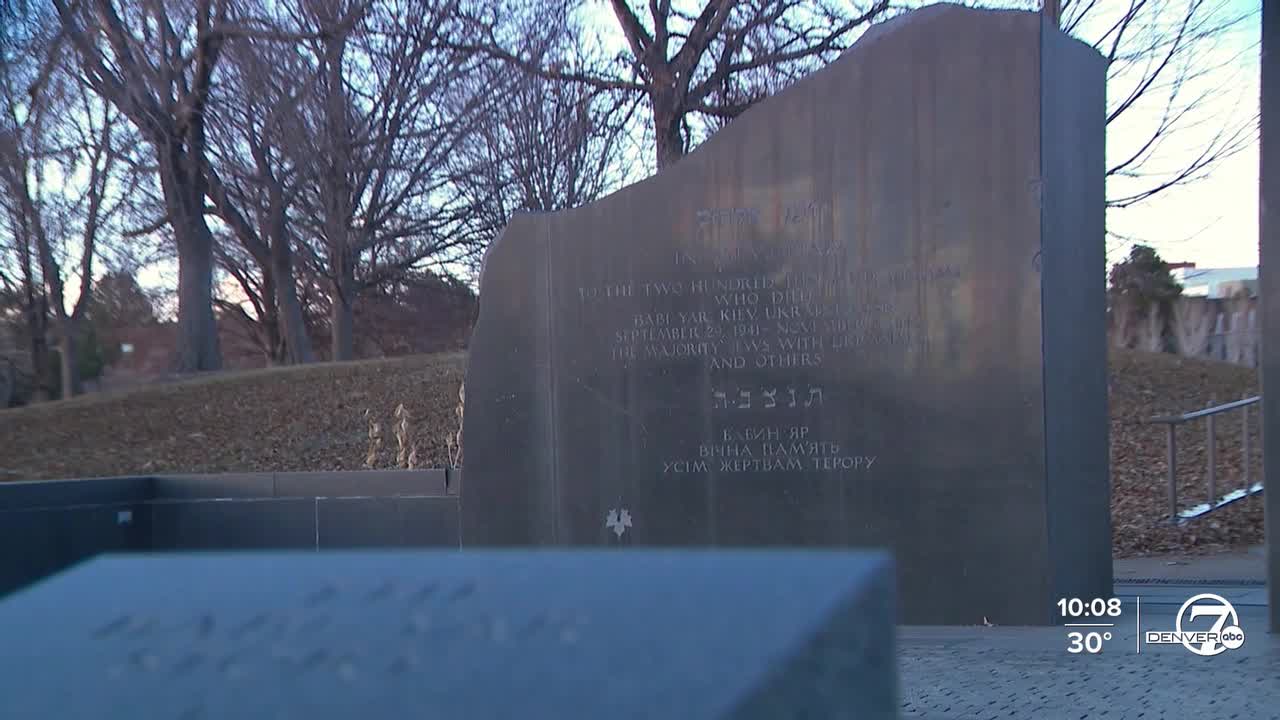DENVER — The nation is remembering the life and legacy of former President Jimmy Carter following his death on Sunday. He was 100 years old.
Carter was known as a humanitarian and visited Colorado in 2013 with Habitat for Humanity to help build and repair homes. However, he has another connection to the Centennial State, dating back to the early 1980s.
“Where do we begin?” asked Helen Ginsburg, with her toy poodle, Tucker, sitting on her lap. Ginsburg, 90, was born and raised in Denver.

In 1941, Nazi soldiers killed thousands of people at Babi Yar, a ravine in Ukraine.
"They call it the Holocaust by Bullet," said Ginsburg, who is Jewish. “The people were rounded up — men in one line, women in another, and even the children. They were forced to walk through the town, strip naked and stand there while they shot them all down, hoping they'd fall into the ravine and they wouldn't have a sloppy mess to have to clear up. And that's where it all began.”
Ginsburg knew she wanted a memorial in Denver to call attention to what happened at Babi Yar but did not know where she could acquire the funding to do so.
“I wasn't able to get enough money raised for the park, and it was: do it or it's going to die," she explained.
At the time, Ginsburg was the founding president of the Babi Yar Park Foundation but board members were dropping like flies.
"There were about 30 on the board, but four men stayed with me," Ginsburg recalled. “I came to one of our meetings, and I said, 'I know where we're going to get the money.' 'Where is that?' I said, 'I've got to go to Washington [D.C.] to speak to President Carter.' And they looked at me like I was out of my mind... One of them did have connections in Washington that he thought could find out about getting me in for an interview. And it all worked. And off I went.”
Ginsburg was hopeful when she entered the White House, ready to meet with then-President Jimmy Carter. She was the only woman inside the meeting and made her presentation to the president first.
"I got up and I gave my talk, and hoped I was remembering most everything. But when I finished, I pulled out this long, thick envelope I had brought with me that had every detail you could think of so he could read up if he needed to get more information. And he said, 'I won't need that. I am going to give you what you need for this park,'" Ginsburg said. “He explained that the $178,000 we'd be receiving — isn't that an amazing number? — that was what was left over from the Big Thompson Flood years before no one had claimed it for any other purpose.”

Ginsburg was thrilled and could only think about her dreams of a Babi Yar memorial becoming a reality during the rest of the meeting. As the group prepared to exit the room, Carter asked Ginsburg to stay back for a moment.
"He said, 'I think there ought to be a Holocaust Museum here in the United States.' And I said, 'Well, that's a wonderful idea,'" said Ginsburg.
Ginsburg told Carter the museum should be located in Washington, D.C.
"I'm sure I wasn't the only person that told him that, but it was thrilling that he asked me with such deep sincerity," Ginsburg said. “I went to Washington for over a year, flown out on their dollar, to be a consultant with the huge committee that was formed to plan and build a museum — everything — because he felt that Babi Yar Park here in Denver was sort of a trial run and that I would encounter the kinds of problems they might encounter and what were they. And I sure was able to tell them. And it was a wonderful time in my life."
What Ginsburg remembers most about Carter is the way he treated her and her ideas.
“Very warm, caring, really human, human being. And I think our country needs a lot of that right now," said Ginsburg.
She wrote to Carter, inviting him to the dedication of Babi Yar Park. While he was not able to attend, Carter replied to her letter and said he would be there in spirit.

“I think that says a lot not only about the man but about Colorado and the importance of the message of Babi Yar Park," said Ginsburg.
Today, Babi Yar Park Memorial is a 27-acre park located in Denver's Hampden neighborhood.





Denver7 is committed to making a difference in our community by standing up for what's right, listening, lending a helping hand and following through on promises. See that work in action, in the videos above.



